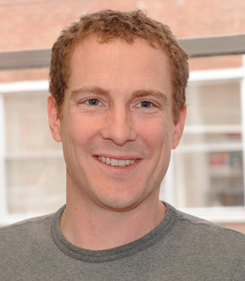Jamie Beagent
Partner and Head of the Human Rights & Public Law Department, Leigh Day
Jamie studied Classics at Somerville College (1994-98) before undertaking the CPE and LPC and embarking on a legal career.

Jamie Beagent is a Partner and Head of the Human Rights & Public Law Department at Leigh Day. He trained at Sharpe Pritchard solicitors before joining Leigh Day in 2003, becoming a partner in 2014. Leigh Day are a renowned claimant litigation firm and Jamie specialised in public law, working on some of the more high-profile judicial reviews of the last 15 years, including the case of Binyam Mohamed and the BAE/Saudi arms export corruption case under the Tony Blair government.
Why did you choose to study at Oxford University?
I loved the history and architecture of Oxford (and it always rained when I went to Cambridge). However, if I am being honest, it was the weight of expectation in coming from a privileged background. But I hope that I am now paying some of that back through my work and the way Leigh Day focuses on access to justice as well as increasing access to the legal profession.
Somerville College was my life for 4 years (I even stayed up over the holidays to work at the college for periods). I made great friends and have very happy memories.
What was the biggest influence on you when you studied at Oxford university?
From an academic point of view: my school teacher, Mike Vogel (sadly now passed away) who inspired my love of Latin and Greek; and my college tutor Lesley Brown who showed bottomless patience and support for an often wayward student.
How did your time at Oxford help guide you on your career path?
Oxford, and Somerville College in particular, opened my eyes to so many new perspectives in life. It was highly instructive joining a college which up until that year (1994) had been women-only – particularly coming from a single-sex educational background which was all male. It was a bit of a shock to the system but I learned an awful in a short period of time. I think this experience underpinned my move into a career away from the typical one of public school, Oxbridge, the City and to focus on the wider societal good that can be achieved through work.
What attracted you to a career in Law?
A lack of imagination initially. But then a passion developed working as a paralegal for asylum seekers in my year out between law school and starting my training contract. I was very lucky to get a newly qualified position at Leigh Day in public law and human rights – the opportunity arose just as I was completing my training contract. The job was working with Richard Stein, a legend of claimant judicial review. Richard was a larger than life character who not only gave me the opportunity of working on some of the most high profile judicial reviews at the time (Corner House, Binyam Mohamed, the challenge to the dropped prosecution of BAE Systems over arms to Saudi Arabia) but also gave me encouragement and free reign to develop own cases.
The firm has been wonderfully supportive of the human rights and public law work that we do, although it is far from being a lucrative area. It is now roughly four times the size it was when I joined 17 years ago. It has come under enormous pressure and scrutiny as a result of taking on governments, big business and vested interests. But throughout it all it has maintained its ethos of standing up for the small person and taking on cases that others might fear bring.
Do you have any interesting career stories?
Perhaps the strangest was travelling to Loughborough in the middle of the night in order to stake out a newsagent. I was supposed to serve papers on a Defendant who was using it as a post-box. We had intelligence that he would collect his post early in the morning so I had to be in place by 06.00 when the shop opened. It was bitterly cold and after a couple of hours with one or two false starts I decided to ask the shopkeeper directly. He told me that X had not been in this morning and probably wouldn’t be coming if he hadn’t arrived already. Clearly feeling sorry for me, he even offered me a cup of coffee if I wanted to wait a bit longer. I returned to London with my tail between my legs but fortunately X himself got in contact with us to arrange a meeting later that day (he has been in London all along) and were able to serve the papers in a much more comfortable environment!
What success stories/achievements have you had in your career so far?
Bringing the Corner House case which established the precedent for Protective Costs Orders (now ‘Costs Capping Orders’) in public interest judicial review litigation. Seeing Binyam Mohamed released from Guantanamo Bay and returned to the UK after our judicial view forced the government to admit the degree of its complicity in his rendition and torture. Establishing the systemic failings in the operation of the Home Office’s policy for not detaining victims of torture in immigration detention and securing damages for numerous vulnerable individuals wrongly detained.
What advice would you like to share for those interested in sharing a similar career path?
Don’t predetermine your career path – you may well surprise yourself as to what you enjoy doing and where you end up. For as long as you practice law, you continue to learn.


